2017 Aegean Sea earthquake
A magnitude 6.6 earthquake struck on 21 July 2017, about 10 km (6.2 mi) south southeast of Bodrum, Turkey, at depth of 7.0 km. Two people were killed and more than 120 others were injured on the Greek island of Kos, while at least 360 injuries were reported in Turkey.[1][2][3][4]
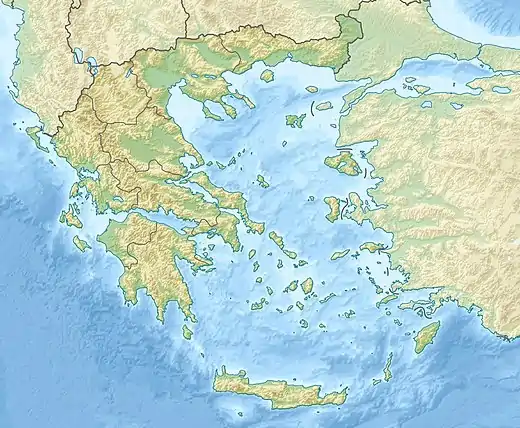 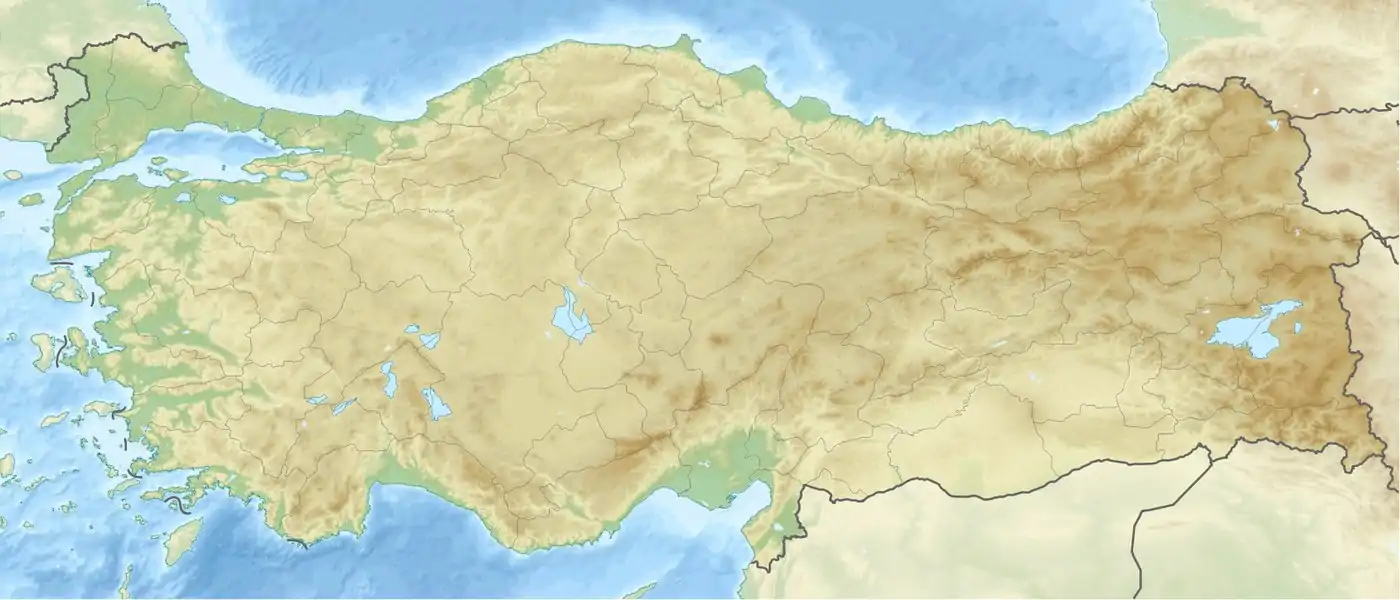 | |
| UTC time | 2017-07-20 22:31:11 |
|---|---|
| ISC event | 610790782 |
| USGS-ANSS | ComCat |
| Local date | 21 July 2017 |
| Local time | 01:31 (EEST) (UTC+03.00) |
| Magnitude | 6.6 Mww |
| Depth | 7.0 km (4.3 mi) |
| Epicenter | 36.923°N 27.415°E |
| Areas affected | Greece Turkey |
| Total damage | Building and infrastructure damage, tsunami wave, flooding, landslides |
| Max. intensity | VII (Very Strong) |
| Tsunami | Up to 1.9 m (6.2 ft) along the Greek and Turkish coasts |
| Casualties | 2 killed, 480+ injured |
Earthquake
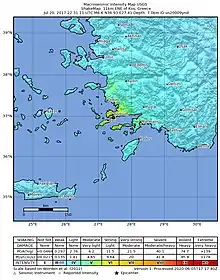
The earthquake's epicentre was located just southwest of the small island of Kara Ada on the northern side of the Gulf of Gökova. The gulf is a result of extensional tectonics related to ongoing subduction of the African Plate beneath the Aegean Sea Plate,[1] and is currently expanding in a north-south direction on a set of west-east trending normal faults. The current opening rate is estimated to be at least 1.1 mm per year.[5]
The earthquake had an estimated magnitude of 6.6 on the moment magnitude scale. The maximum perceived shaking was VII on the Mercalli intensity scale. The focal mechanism of the earthquake shows that it was the result of movement on a west-east trending normal fault, although the dip direction of the fault remains uncertain.[1]
Tsunami
A tsunami with a maximum height of 1.9 m was triggered by the earthquake and caused local flooding and some damage along the coasts of Kos and the Bodrum Peninsula. The height along the coasts was not uniform: some bays presented large height and inundation and other bays were much less hit. In Bodrum area (Turkey) the maximum height was measured in the Gumbet Bay; in Kos island (Greece) the largest height was measured in the Kos port, 1.5 m.[6][4]
Damage and aftermath
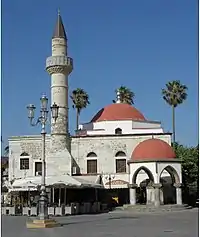
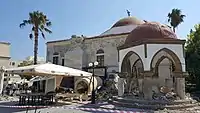
Extensive damage took place on the island of Kos, and to a lesser degree in the area around Bodrum. On Kos, the old town was worst affected, with the cathedral, the 18th century Defterdar mosque, and a 14th-century castle being badly damaged. The main harbour had its floor crack as a result of the tremor, and was subsequently declared unsafe for use by government officials, who rerouted all ferries to the smaller port town of Kefalos in west Kos.[2]
Two fatalities were reported on the island, in addition to more than 120 injuries.[2] The two dead were identified as Turkish and Swedish nationals, and were killed when the upper facade of a bar collapsed on top of them.[4] Seven seriously injured people on Kos were flown to hospitals in Athens and Heraklion, including two men from Sweden and Norway in critical condition. Around 360 people were injured in Bodrum, many after jumping out of windows in panic, but none of the injuries were regarded as serious.[2][7][8]
See also
References
- "M 6.7 - 10km SSE of Bodrum, Turkey". United States Geological Survey. 21 July 2017. Retrieved 20 July 2017.
- France-Presse, Agence (22 July 2017). "Greece and Turkey struggle in aftermath of quake that killed two". The Guardian. Retrieved 23 July 2017.
- Phipps, Claire; Rawlinson, Kevin; Smith, Helena; Smith, Helena; Smith, Helena; Smith, Helena; Smith, Helena; Phipps, Claire (21 July 2017). "Turkey and Greece hit by strong earthquake: two dead and 200 injured – latest". The Guardian. Retrieved 21 July 2017.
- Rourke, Helena Smith Alison (21 July 2017). "Earthquake in Turkey and Greece leaves at least two dead in Kos, 200 injured". The Guardian. Retrieved 21 July 2017.
- Kurta H.; Demirbağa E.; Kuşçub İ. (1999). "Investigation of the submarine active tectonism in the Gulf of Gökova, southwest Anatolia–southeast Aegean Sea, by multi-channel seismic reflection data". Tectonophysics. 305 (4): 477–496. Bibcode:1999Tectp.305..477K. doi:10.1016/S0040-1951(99)00037-2.
- Yalciner A.; et al. "THE 20th JULY 2017 (22:31 UTC) BODRUM/KOS EARTHQUAKE AND TSUNAMI; POST TSUNAMI FIELD SURVEY REPORT" (PDF). Cite journal requires
|journal=(help) - Kitsantonis, Niki (21 July 2017). "Earthquake in Aegean Sea Kills 2 Tourists". The New York Times.
- Boyle D. & Millward D. (21 July 2017). "Earthquake rocks Greece and Turkey: Two dead on Kos as hundreds of tourists hurt amid tsunami". The Telegraph.
External links
- The International Seismological Centre has a bibliography and/or authoritative data for this event.